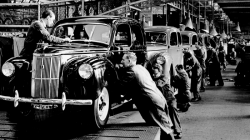The Man, The Legacy
Make no mistake about it, Henry Ford has been one of the greatest, if not the greatest influencers of our society for 100 years or more. His business savvy and creative genius have given the US, and the world many marvelous inventions, paradigms and nuggets of wisdom.
Most notably, Henry Ford perfected the factory and the assembly line inside of it, which together formed the primary means of production in the industrial economy. While the assembly line and factory did much to advance the nation as a whole, and significantly line the pockets of a few, it has also done a great deal of damage to “the masses.”
Means of Production
Henry Ford’s factory/assembly line production model dictates which roles, responsibilities and skills are important, and which are not. Overall, I believe what this model implies about the value of “average” people, ultimately resulted in a much greater negative influence in our society than it has for good; and, perhaps has precipitated some of the deep rooted economic and societal issues we are struggling with today in this nation and around the world.
It was Seth Godin who articulated this phenomenon and enlightened me to the serious ramifications of the the industrial revolution model, especially as we begin to move into a post-industrial economy. Seth explains that the Henry Ford factory production model, stresses compliance, uniformity, falling in line, and clear-cut, simplistic delineation of roles and responsibility.
There are assembly-line workers, assembly-line supervisors, factor managers and factory owners. Owners, and to a lesser extent managers, hold all of the cards and are responsible for all of the innovation and creative thinking. Innovative and creative thinking at the assembly-line level is not only discouraged, but in most cases forbidden. The assembly-line worker and even the direct supervisor are thought of as little more than trained monkeys.
Give me Monkeys, Please
Henry Ford is quoted as saying, “Why is it every time I ask for a pair of hands, they come with a brain attached?” In Henry Ford’s system, people are only as valuable as the simple, repetitive task that they can perform. They are interchangeable, nameless and faceless. Henry Ford has no use for uniquely created masterpieces made in the image of God; what he needs are robots without brains, without personalities, feelings, dreams and desires.
I have worked for several large tech companies at various levels of management. One of the primary objectives of the executive management was to eliminate the high-paid coding experts through a combination of rigorous processes that eliminate the need for high competence, and outsourcing / offshoring which allows leverage of under-resourced individuals to lower salaries.
The message from the top at every company I worked was very similar, “I want to be able to put monkeys in the chairs and have them cranking out code that works!” That is a great illustration of the value system of the industrial economy. Creativity, leadership, excellence, high pay and leverage only belongs at the very top of the executive food chain. The goal for every level beneath the executive level is – monkeys. Inexpensive robots – mindless automatons that can and should be replaced with the lowest priced alternatives on an ongoing basis.
Societal Impact
That is the value system that the industrial economy is based on, and the foundation that our modern society is built on. Of the industrial economy, Seth says, “We invented public schools… jobs … suburbs—so many of the things that are part of our lives because we wanted and needed to support the industrial economy…. It was a very seductive bargain: if you gave up certain elements of self-determination and elements of your dreams—in return, the industrial economy would take good care of you.”
That’s right. Everything for the last 120+ years has been designed around the industrial economy – factory/assembly-line production model. Daycares, grade schools, secondary schools, colleges, job training programs, management and HR practices, churches – most everything. The system sees most of us, our kids, friends, relatives and neighbors as tools/cogs the elite use to make more money.
Are we Ready for the Future?
Certainly devaluing most of society and relegating them to a mindless, innovation and creativity free existence is a bad thing, but we have another, more pressing issue with running our organizations and societies on industrial economy principles – we are quickly moving into a post-industrial society, where uniqueness, individuality, entrepreneurship and specialty will rule the day.
The skills, abilities and motivations that prepare someone for a life-long journey in the industrial economy are completely inadequate for preparing someone to be successful in the post-industrial, connection-based economy that we have been moving into for the last several years. The good news is that it is not too late to opt out of the old system and jump into a new system. It will require a complete paradigm shift, and the onboarding of new systems and processes that value the individual over the task.
A Better Way
Seeing every individual as a unique, creative, critical, contributing component to any endeavor from business to education to outreach and ministry is the key to thriving in the new post-industrial, connection-based economy. We need to adopt new systems that formulate the tactics that align with this new overall strategy. What may these new strategies and tactics be? I’m glad you asked!
The research, development and effective onboarding of the most effective systems and processes that implement the strategies and tactics around post-industrial excellence have been the center of many of the efforts my partners and I have investing in over the last several years. We will be unpacking what we have learned through new initiatives over the next several weeks and months. Stay tuned!
| Read this short story excerpt taken from Set Godin’s eBook titled, Stop Stealing Dreams |

Leave a Reply